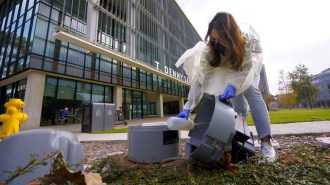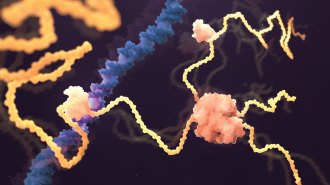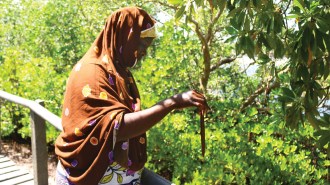Feature
-
 Health & Medicine
Health & MedicineChristopher Barnes is on a quest for a universal coronavirus vaccine
Christopher Barnes wants to stop the viruses that cause COVID-19, the common cold and more.
-
 Planetary Science
Planetary ScienceRobin Wordsworth re-creates the atmosphere of ancient Mars
Robin Wordsworth studies the climates of Mars and other alien worlds to find out whether they could support life.
By Nikk Ogasa -
 Health & Medicine
Health & MedicineSmruthi Karthikeyan turned to wastewater to get ahead of COVID-19
Smruthi Karthikeyan’s system for tracking the coronavirus gives lifesaving public health measures a head start.
-
 Science & Society
Science & SocietyBig questions inspire the scientists on this year’s SN 10 list
These scientists to watch study climate change, alien worlds, human evolution, the coronavirus and more.
-
 Anthropology
AnthropologyTina Lasisi wants to untangle the evolution of human hair
Tina Lasisi is pioneering studies of human variation in an ethical and scientifically sound way.
By Aina Abell -
 Earth
EarthJacky Austermann looks to the solid earth for clues to sea level rise
Jacky Austermann’s work could help inform practical climate change solutions for at-risk coastal cities.
By Aina Abell -
 Particle Physics
Particle PhysicsCarlos Argüelles hunts for particles beyond the standard model
Carlos Argüelles overcame hardship and discrimination to pursue a passion for physics.
By Asa Stahl -
 Ecosystems
EcosystemsA Caribbean island gets everyone involved in protecting beloved species
Scientists on Saba are introducing island residents to conservation of Caribbean orchids, red-billed tropicbirds and urchins.
By Anna Gibbs -
 Life
LifeHas AlphaFold actually solved biology’s protein-folding problem?
An AI called AlphaFold predicted structures for nearly every protein known to science. Those predictions aren’t without limits, some researchers say.
-
 Climate
ClimateHow Kenyans help themselves and the planet by saving mangrove trees
Communities in Kenya took action to restore their coastal mangrove forests, reaping economic and environmental benefits. Others are following suit.
-
 Climate
ClimateHow to make recyclable plastics out of CO2 to slow climate change
Companies are turning atmospheric CO2 from smokestacks and landfills into plastics to shrink their carbon footprint.
-
 Climate
ClimateA carbon footprint life cycle assessment can cut down on greenwashing
As companies try to reduce their carbon footprint, many are doing life cycle assessments to quantify the full carbon cost of their products.